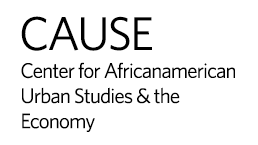Center for Africanamerican Urban Studies & the Economy (CAUSE)
Department of History, Dietrich College of Humanities and Social Sciences, Carnegie Mellon University

Founded in 1995, CAUSE is an interdisciplinary research and education center in the Department of History, Dietrich College of Humanities and Social Sciences, Carnegie Mellon University. Focusing on African American urban life and history since the transatlantic slave trade, the Center encourages scholarship that addresses the historian’s interest in understanding socioeconomic, political, and cultural change over time; employs a variety of interdisciplinary and comparative perspectives; and attends to the impact of broader global as well as local, regional, and national developments on the black experience.
CAUSE also aims to develop programs of graduate and postdoctoral education and training; facilitate scholarly research, data collection and education; establish electronic databases of primary and secondary sources on the African American experience in the urban economy; collect, transcribe, and deposit oral interviews on the role of blacks in the late industrial and recent post-industrial economy, particularly in Pittsburgh and Western Pennsylvania; and build bridges between the University and African American communities in the larger Pittsburgh metropolitan region, the state, the nation, and the world.
Our Program
Since its inception in 1995, the Center has sponsored a variety of programs and projects designed to achieve its mission. These include programs of graduate, postdoctoral, and faculty research on topics defined within the Center's mission statement; support for historical and interdisciplinary scholarly publications (both books and articles in professional journals) that appeal to a broad cross section of scholars and students, public policy experts, and public audiences; support for an undergraduate Minor in African and African American Studies; a regular speakers series; scholarly conferences on specific topics of interest to historians, educators, activists, and policy makers; collaboration with scholars at other universities through such programs as the Midwest Consortium for Black Studies, the Heinz Regional History Center, a Smithsonian Institution Affiliate, the African Studies Research Consortium, and the Labor and Working Class History Association; projects aimed at strengthening ties between the University and the larger Pittsburgh metropolitan region, including programs with the Urban League of Pittsburgh, the Pittsburgh Public Schools, and the August Wilson Center for African American Culture; and our “Remembering African Americans in Pittsburgh” (“RAP”) Oral History Project as well as periodic workshops and special lectures for religious, fraternal, business, professional, labor, social service, and government organizations.